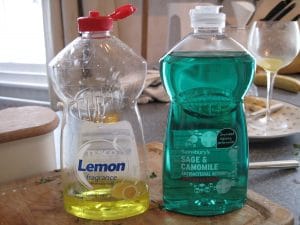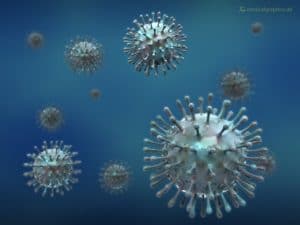Dishwashing products have been designed and manufactured to cleanse and scour dish-ware. Foam, viscosity, and grease-cutting are important properties of modern effective dish soaps.
Usually dishwashing products can be found in liquid, gel, or powder forms. Dishwashing products are formed from combining surfactants, foam, and lather to effectively sanitize cutlery, glasses, cooking utensils, cookware, plates, and bowls.
However, washing dishes alone, does not sterilize, instead, it simply removes food debris and grease as well as most of the bacteria that lurk there. There will always be a small number of bacteria left over, even on washed surfaces.
However, these bacteria cannot grow because there is no remaining food or moisture. It is important to remember that A domestic kitchen does not compare to a hospital operating room, where instruments have been subject to a thorough sterilizing process.

Commercial establishments are subject to regional statutes, involving a “sanitizing” step after washing.
This includes, but is not limited to, a mechanical ‘hot’ water rinse, or a final rinse in a special sanitizing solution, such as concentrated hypochlorite or quaternary ammonium.
Dishwashing liquid is very effective against most viruses. Here’s how soap kills the coronavirus:
Bacteria and viruses
With the emergence of a Covid-19 there is more concerned than ever about eradicating germs from, not only commercial settings but also our households.
We look for the most efficient household products and invest in high-quality dishwashing soaps in the hope that they will eradicate all germs from our crockery and cutlery.

Many modern cleaning blogs advise using particular dishwashing soaps for a wide variety of household purposes to make sure that our homes are spotless germ-free sanctuaries where we can live fear free from bacteria and viruses.
Dishwashing liquid was designed to remove grease and food residue from dishes, which allows the water to wash away the germs and viruses. The covid-19 virus is surrounded by a lipid coat, this is a liquid fat membrane which is broken down by dishwashing liquid, in turn destroying the virus.
It is the scrubbing with soap that breaks down germs and viruses, and for that reason antibacterial soap thought to ben isn’t any better than regular dishwashing soap at sanitizing our regular dishes. (source)
Dishwashers when compared to hand-washing
Those of us who prefer to use dishwashers can be confident that the scalding hot temperatures will ensure that all viruses and germs will be eradicated and dishes properly sterilized.
Those dishwashing products which contain bleach are particularly effective at removing germs.
Many dishwasher products include ingredients that are designed to break down enzymes, breaking down starches and proteins, making sure that dishes are left sparkling.
High temperature and soap killing germs (bacteria/viruses)
Even when hand washing, we should aim for the hottest temperatures possible to minimize the chance of germs been left on our dishes.
However, whilst washing viruses and bacteria with hot water alone might sanitize it does not eradicate the strong, glue-like interactions between dishes and viruses such as Covid-19. Water, even when boiling, isn’t enough on its own.
Dishwashing liquid is essential, because it contains special fat-like substances. These substances are actually similar to the lipids in the virus membrane and the soap molecules then break down the lipids in the virus membrane. This is also how soaps work to remove the dirt from the skin.
What type of bacteria/viruses does dish-wash soap kill?
Dishwashing liquid works by breaking down and dissolving fat into tiny particles which can easily be rinsed off. This allows the remaining fat on dishes to simply be rinsed off with water.
There is far more fat on dishes when compared with our body, and because of this the dishes need a stronger soap for the fat to dissolve into these smaller particles than the soap we would need to use on our hands or as part of our body.
At the same time, dish-soap is stronger than the soap we use for our skin and is much more likely to cause skin irritation when compared with the soap specially designed for use on our skin.
Nonetheless, it is perfectly possible to wash your hands with dishwashing liquid, and equally possible to wash your dishes with soap made for washing your skin. It is a misunderstanding that dish soap kills 99.9 % of the germs.
Soap alone cannot do that. It is the washing process that results in 99.9 % of germs being eradicated if done properly.
Active ingredients
Some dishwashing liquid includes an active ingredient called triclosan. This ingredient is an effective antibiotic which kills a wide range of bacteria.
At low concentrations found in dish-soaps, it does not kill bacteria but it stops their spread. However, such antibiotic cleaning agents are gradually being phased out where it’s not absolutely necessary.
This is because, like all antibiotics, triclosan is finding its way into the water supply and resulting in the emergence of antibiotic-resistant “superbugs” that are responsible for even more serious diseases. Most (not all) dish soaps have now stopped using it triclosan this reason.
Hot water
A very hot water wash with normal dish soap is more than adequate for cleaning dishes in our homes. Whilst the antibiotic soap kills bacteria, most bacteria will be broken down and killed by heat and soap alone, and the nastiest bacteria have now become resistant to triclosan.
Triclosan has the negative effect of making bacteria harder to kill. A good quality dishwashing soap with very hot water is the most effective method of killing most household germs, including Covid-19. (source)
How to ensure proper disinfection
To keep your household germ free, it is very important to follow these steps to keep spotless, perfectly clean dishes.
Make sure that you to clean all of your sponges thoroughly after use, frequently replacing them. A good guide, is to replace your sponges weekly. Another tip is to wet the sponges and microwave them on the highest setting for two minutes. A dish brush with nylon bristles is also a good investment as they aren’t as prone to bacteria buildup.
By hand?
When you wash your dishes by hand, make sure that the water temperature is as hot as you can get it. Water needs to be 140 degrees Fahrenheit to kill germs, this is scalding hot and requires a great deal of care.
This is one o f the reasons why using a dishwasher is good for ensuring water is hot enough to ensure dishes are properly sanitized. Make sure that you use a good quality pair of rubber gloves to protect your skin.
Always wash all of your dishes thoroughly. Scrub well, and be particularly careful to wash the entire surface of all dishes and cookware and clean utensils thoroughly.
The hard to reach parts of cutlery means that more bacteria can be hiding among the hard-to-reach prongs and grooves, than in plates. Make sure that you take extra time to lather, rinse, and repeat for your cutlery to ensure that it is properly sanitized.
Finally, make sure that you always wash your hands thoroughly after handling used dishes to minimize the transmission of germs. (source)
Can you use dishwashing liquid in other places?
Dish soap is one of the safest of all cleaning products, designed to be kind on kin and safe in our dishes. The gentle nature of dish soap makes it an excellent choice for many many household uses.
Dish soap has even been used by environmentalists to save thousands of birds badly soiled by ocean oil spills throughout the world.
Dish soap can be used as an excellent floor cleaner, to remove oil-based stains from fabric, to clean surfaces, appliances, and even glass. The degreasing properties of dish soap even make it excellent for cleaning kitchen cupboards.
Dish-wash soap should not usually be used in place of shampoo, however. This is because the enzymes break down the natural oils and greases contained in the structures of the hair.
This then strips hair of moisture and causes the hair to become very dry and brittle. On the occasion where a hair dye has gone wrong or hair grease has built up and cannot be removed from normal shampoo, dish soap can be used to strip the hair.
Another occasion, where dishwashing soap can be used in place of shampoo, is on occasion where hair dye has gone wrong.
Conclusion
In conclusion, dish soap is a remarkable piece of kitchen kit. It can be used in so many ways to keep dishes, as well as surfaces as germ-free as possible, whilst remaining kind on our dishes hand hands.
It is very hard to imagine a life where this simple product does not exist amongst our kitchen cupboards.
From antibiotic dishwashing liquids that clean dishes to standards that could be compared to operating theatres of hospitals to simple cleaning agents that break down dirt to allow the hot water to kill and sanitize the bacteria to a safe degree, there is a wide range of choice when it comes to dish-washing liquid.
However, the simplest forms are the most effective at cleaning and sanitizing without encouraging the growth of superbugs. (source)
